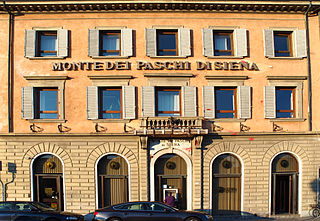Activities
The EFR is engaged in the lessons to be drawn from the financial crisis to render the financial system more resilient. The EFR deals in particular with the global G20 agenda, regulation and supervision, consumer protection and pensions. Current priorities are the Growth & Investment Agenda, the Digital Agenda & Cyber Security, Sustainable finance & Climate Change, Prudential Regulation The EFR has published, inter alia, positions, reports and press releases on those priority issues as well as on a wide range of topics such as European retail market, G20 agenda, the integration of pensions in Europe, harmonisation of regulation and supervision and consumer protection.

A financial institution, sometimes called a banking institution, is a business entity that provides service as an intermediary for different types of financial monetary transactions. Broadly speaking, there are three major types of financial institution:
- Depository institution – deposit-taking institution that accepts and manages deposits and makes loans, including bank, building society, credit union, trust company, and mortgage broker;
- Contractual institution – insurance company and pension fund
- Investment institution – investment bank, underwriter, and other different types of financial entities managing investments.

The Financial Services Authority (FSA) was a quasi-judicial body accountable for the regulation of the financial services industry in the United Kingdom between 2001 and 2013. It was founded as the Securities and Investments Board (SIB) in 1985. Its board was appointed by the Treasury, although it operated independently of government. It was structured as a company limited by guarantee and was funded entirely by fees charged to the financial services industry.
The Australian Prudential Regulation Authority (APRA) is a statutory authority of the Australian Government and the prudential regulator of the Australian financial services industry. APRA was established on 1 July 1998 in response to the recommendations of the Wallis Inquiry. APRA's authority and scope is determined pursuant to the Australian Prudential Regulation Authority Act, 1998 (Cth).

Banking regulation and supervision refers to a form of financial regulation which subjects banks to certain requirements, restrictions and guidelines, enforced by a financial regulatory authority generally referred to as banking supervisor, with semantic variations across jurisdictions. By and large, banking regulation and supervision aims at ensuring that banks are safe and sound and at fostering market transparency between banks and the individuals and corporations with whom they conduct business.
The Australian financial system consists of the arrangements covering the borrowing and lending of funds and the transfer of ownership of financial claims in Australia, comprising:

The Financial Services Compensation Scheme (FSCS) is the UK's statutory compensation scheme for customers of UK authorised financial services firms. This means that FSCS can step in to pay compensation if a firm is unable, or likely to be unable, to pay claims against it. Compensation can be in any form and by any method that at the FSCS determines is appropriate. FSCS is an operationally independent body, set up under the Financial Services and Markets Act 2000 (FSMA), and funded by a levy on authorised financial services firms. The scheme rules of the FSCS are made by the Financial Conduct Authority (FCA) and are contained in the FCA's Handbook. The FCA also appoint its Board and the FSCS is ultimately accountable to the FCA. The scheme covers deposits, insurance, debt management, funeral plans, insurance, investments, pensions, mortgages and payment protection insurance.
A non-banking financial institution (NBFI) or non-bank financial company (NBFC) is a financial institution that is not legally a bank; it does not have a full banking license or is not supervised by a national or international banking regulatory agency. NBFC facilitate bank-related financial services, such as investment, risk pooling, contractual savings, and market brokering. Examples of these include hedge funds, insurance firms, pawn shops, cashier's check issuers, check cashing locations, payday lending, currency exchanges, and microloan organizations. Alan Greenspan has identified the role of NBFIs in strengthening an economy, as they provide "multiple alternatives to transform an economy's savings into capital investment which act as backup facilities should the primary form of intermediation fail."

The Financial Supervisory Service (FSS) is South Korea's integrated financial regulator that examines and supervises financial institutions under the broad oversight of the Financial Services Commission (FSC), the government regulatory authority staffed by civil servants.
The Committee of European Banking Supervisors (CEBS) was an independent advisory group on banking supervision in the European Union (EU). Established by the European Commission in 2004 by Decision 2004/5/EC, and its charter revised on 23 January 2009, it was composed of senior representatives of bank supervisory authorities and central banks of the European Union. On 1 January 2011, this committee was succeeded by the European Banking Authority (EBA), which took over all existing and ongoing tasks and responsibilities of the Committee of European Banking Supervisors (CEBS). The European Banking Authority was established by Regulation (EC) No. 1093/2010 of the European Parliament and of the Council of 24 November 2010.
The banking system in Austria plays a pivotal role in the country's economy, ensuring financial stability and providing essential services to both individuals and businesses. The Austrian banking system is characterized by a three-tier structure, consisting of joint-stock banks, savings banks (Sparkassen), and cooperative banks.
The International Association of Insurance Supervisors (IAIS) is a voluntary membership organization of insurance supervisors from over 190 jurisdictions, constituting 97% of the world's insurance premiums. It is the international standards-setting body for the insurance sector. The IAIS was established in 1994 and operates as a verein, a type of non-profit organisation under Swiss Civil Law.

The National Securities Market Commission is the Spanish government agency responsible for the financial regulation of the securities markets in Spain. It is an independent agency that falls under the Ministry of Economy.

The Financial Services Board (FSB) was the government of South Africa's financial regulatory agency responsible for the non-banking financial services industry in South Africa from 1990 to 2018. On the 1 April 2018 its responsibilities were split into two new agencies the Financial Sector Conduct Authority (FSCA) for conduct regulation and the Prudential Authority (PA) for prudential regulation.

The European Banking Authority (EBA) is a regulatory agency of the European Union headquartered in La Défense, Île-de-France. Its activities include conducting stress tests on European banks to increase transparency in the European financial system and identifying weaknesses in banks' capital structures.
Financial regulation in Australia is extensive and detailed.

The Financial Services and Markets Authority (FSMA) is the financial regulatory agency in Belgium.
The Financial Sector Legislative Reforms Commission (FSLRC) is a body set up by the Government of India, Ministry of Finance, on 24 March 2011, to review and rewrite the legal-institutional architecture of the Indian financial sector. This Commission is chaired by a former Judge of the Supreme Court of India, Justice B. N. Srikrishna and has an eclectic mix of expert members drawn from the fields of finance, economics, public administration, law etc.
Financial Market Supervisory Authority better known by its abbreviation FIMSA, was the financial regulatory authority in Azerbaijan for the period of February 2016 – November 2019. Within this period FIMSA was responsible for supervising the activities of banks, non-bank credit organizations, insurance companies, stock exchanges, securities dealers and other financial intermediaries; implementation of macro-prudential supervision; participation in the preparation of normative legal acts related to the regulation of financial markets; issuing licenses in the financial markets.

The Capital Markets Union (CMU) is an economic policy initiative launched by the former president of the European Commission, Jean-Claude Junker in the initial exposition of his policy agenda on 15 July 2014. The main target was to create a single market for capital in the whole territory of the EU by the end of 2019. The reasoning behind the idea was to address the issue that corporate finance relies on debt (i.e. bank loans) and the fact that capital markets in Europe were not sufficiently integrated so as to protect the EU and especially the Eurozone from future crisis. The Five Presidents Report of June 2015 proposed the CMU in order to complement the Banking union of the European Union and eventually finish the Economic and Monetary Union (EMU) project. The CMU is supposed to attract 2000 billion dollars more on the European capital markets, on the long-term.









